Rules of War Read online
Page 3
Retrieving his sword from the corpse, Steel looked around. To his left more Grenadiers had succeeded in storming the village and were steadily pushing back the French and Walloon lines. He turned to his men: ‘The village is ours. Well done, lads.’ He looked to Slaughter: ‘Stand the men easy for a moment, Sarn’t; and post a guard. They’ll be back. We can be sure of that.’
Slaughter threw him a grin. ‘That was a fine fight, sir. Did you see ’em run?’
‘They ran all right. But we must have suffered in the assault. What’s our strength?’
‘Hard to say, sir. I know that a score of the lads went down on the hill and I dare say we may have lost half as much again in the fight.’
‘Yes. I thought as much.’
Still, he thought, thirty per cent casualties was what you might expect in a frontal attack and of them perhaps a third again would have been fatal. Ten good men dead then from his company and the day still young. Who, he wondered, had gone down? Was Williams hit? Or Hansam? Steel wiped the sweat from his forehead with his sleeve and looked about. His fears were quelled as from a neighbouring street the young ensign approached him. There was a cut on his right arm, his sleeve was drenched in blood and his face was quite white.
‘Tom. Are you hit?’
‘It’s nothing, sir. A scratch. French officer. I sent him off, sir. Pity. Damned fine swordsman.’
He winced as the pain in his arm cut in and managed a weak smile which told Steel that his wound, though serious, was not life-threatening.
‘I’m sending you to the rear. Best get that wound dressed before an infection sets in. Don’t want you to lose that arm, eh?’
Williams nodded and began to walk towards the lines.
‘He’ll do well, sir, that one. General, likely as not.’
‘If he manages to stay alive long enough, Jacob.’
From their left a tall figure approached – a senior officer. There was no mistaking the chiselled features of Lord Orkney. There was blood on his breeches and he had lost his sash. Otherwise, thought Steel, the youthful, forty-year-old general appeared miraculously unhurt.
‘Sarn’t, stand the men to attention. Officer approaching.’
‘Officer approaching. Stand to there.’
The Grenadiers straightened up and shuffled into three lines.
Orkney nodded to Steel. ‘You did well, Captain.’
‘Thank you, My Lord. But it was my men’s doing. The Grenadiers, sir.’
Orkney peered into Steel’s face. ‘Captain Steel is it not? The hero of Blenheim? Well, whoever claims the glory, it was as well done today as then. We have the village and I do not intend to give it up lightly. I have left your colonel in the centre of the position. Take your Grenadiers and join with those of the First Guards and General Fergusson’s regiment. Place yourselves on the side of the village closest to the French lines. Have your men construct defences. When they come on again, as they are sure to do, we’ll give them a taste of their own style, eh?’
‘Indeed, My Lord. You may rely upon us.’
Orkney was about to compliment Steel further when both men noticed five horsemen approaching from the allied lines. All were dressed in the elaborate uniform of the general staff and all appeared to be aides. It was as unlikely a sight as either of them had ever seen on any battlefield.
‘What d’you make of this, Captain Steel? A group of young gentlemen about town and dressed for the court? By God! Do I see red heels? What the devil shall we make of it?’
‘I do not know, My Lord. But I hazard that we are about to discover.’
The horsemen reined in before Orkney and the two leading riders dismounted. Steel recognized one of them as Benjamin Harley, an aide-de-camp to Marlborough himself. The young man made an exaggeratedly low bow to Orkney and began to speak. His accent was disarmingly soft and quite out of character with the battle raging around them.
‘My Lord. You are to disengage the enemy forthwith and retire two hundred yards.’
Orkney’s bushy eyebrows arched high above widening eyes and his face took on the hue of his coat. For an instant he was speechless. Then, as the aide waited in silence, he found his voice. ‘Disengage? Retire? Are you quite mad, sir? We have the village. This ground is ours. And, God please you, so too will be the day. I shall not disengage, sir. No, sir. I shall not retire.’ He spat the words in contempt. ‘On whose authority have you this order?’
The aide smiled, smugly. ‘It comes direct on the Lord Marlborough’s authority My Lord. It is his express wish that you should disengage the enemy with all speed and return to your starting line.’
Orkney stared at him in disbelief. For an instant Steel wondered whether the general was about to strike the young aide. And in truth he too felt rising indignation. This was too much to take. The duke he trusted implicitly, would follow to the ends of the earth. But to take this order from a young aide, without proper explanation for what seemed utter folly? Orkney took a pace towards the aide.
Steel saw that the boy’s hand had fallen to his sword hilt. This was getting dangerous. Now was not the time for such an argument. He intervened: ‘Sir – if the order has come from the duke himself, d’you not think that it might be prudent to obey? No matter how galling.’
Orkney, his eyes ablaze with rage, turned on him: ‘Captain Steel, I do not need your advice. I … and you, Steel, have left good men lying dead and dying back there. Men who died to take this place. Will you betray them now? We do not retreat. How can you agree with this madness? We are the victors, dammit. We have taken our objective. We have this ground. I shall not surrender it, not even for My Lord Marlborough.’
‘Indeed I too will never betray any of my men, sir, dead or alive. But it is an order, My Lord.’
Orkney regained his composure and, turned again to the white-faced ensign. ‘What is its purpose then? According to the rules of engagement the duty of a commander is to win battles, not to yield at a whim whatever ground he gains. For what possible reason could My Lord Marlborough desire me to retreat?’
Steel noticed that the other aides had now dismounted. One of them, slightly older than Harley, moved forward to speak. ‘Excuse me. Lieutenant the Honourable Greville Bennett, My Lord. It is not a retreat, Lord Orkney. Merely a tactical withdrawal.’
Orkney smashed his fist into the palm of his left hand: ‘Tactical withdrawal?’ He spat the words. ‘Marlborough sends me five of his liverish boys to tell me this. To tell me to retreat. For it is a retreat, dammit, man. No less. Why, I should …’
Again Harley’s hand darted nervously to his sidearm. Steel was about to stand between them when from the mouth of a sidestreet two further horsemen appeared. One was unmistakable as William Cadogan, the Duke of Marlborough’s right-hand man and quartermaster-general. At his side rode another officer, slightly more portly than Cadogan and older. Steel recognized him at once; Colonel James Hawkins, attached to Marlborough’s staff and one of the duke’s oldest friends, had been instrumental in Steel’s advancement to date. He was as good a mentor as he had ever had, but one whom he had not seen these past few weeks.
Hawkins and Cadogan rode up to Orkney and both men dismounted. Cadogan greeted the seething general with a smile. ‘What ho, George. You look as if you may have gone beyond yourself for once. Hold up. Have you not had the duke’s instructions? You are to retire and regroup, My Lord.’
Orkney seemed to stagger. He shook his head. ‘Do not tell me, William, that what this … boy has said is truly the case. That I am indeed ordered to abandon this place. It is my victory, Cadogan. We have the ground. Look for yourself.’
‘I am afraid, George that it is quite so. You see, fact is, you are simply too good for us, and for the French. Fact is, your attack was never more than a diversion intended to draw away the marshal’s reserves from his centre.’
Orkney’s face became an even deeper shade of pink: ‘Diversion? My attack a diversion? I’ll give His Grace diversion, by God. Tell that to those men lying dead
upon that plain and at the barricades. Tell them why they died, by God.’
Cadogan shook his head. He nodded and made to grasp Orkney’s shoulder, but the general recoiled. ‘I know, George, I know. But fact is the duke did not think it prudent to inform you, or any of his commanders …’
Orkney laughed: ‘Not prudent? God’s blood, William! When is it prudent then to attack at all?’
A French battery on the high ground behind the village, observing the group of officers standing in the square, had ranged them and now shot began to fall perilously close, crashing into the cobbles and sending up splinters of stone.
Cadogan spoke again, in a more official tone: ‘Lord Orkney, the clear truth of the matter is, you have no cavalry in support of you. Look beyond the village. His Grace has commanded all the horse to move to the centre there to engage the enemy and to rout him. And that will happen. Look for yourself. You are isolated – stay here and you will without doubt be outflanked. You must retire, my friend, and you must do so at once. I am truly sorry.’
Orkney rubbed at his wig with his hands and then at his rheumy eyes. Finally, staring at the aide he nodded. ‘Very well. I shall do as you ask. But only as you come direct from His Grace and at the personal request of Lord Cadogan here. Inform the duke that I intend to ride to him forthwith and if I find you to be at fault then I shall not hesitate to make you pay, so help me.’
As Cadogan smiled and clapped the general on the back, Hawkins, who had remained silent, walked up to Steel, smiling. ‘They’re old friends, Jack. I grant you it goes against everything we should do. But there is sense in it, brilliance even. No doubt they will settle it amicably over a glass of wine, once we have beaten Marshal Villeroi.’
‘Are we winning then, sir?’
‘Now, Jack, I would be a foolish man to say that, wouldn’t I? While you were up here taking this village, down there on the plain there has been a great cavalry battle. General Overkirk has turned the French horse. Now though comes the real crisis. If this next manoeuvre goes according to the duke’s plan then I do believe that very soon we might well be the victors. It’s as well that I found you, Jack, although you’d have got it by hand of an orderly just as well. The Guards are to remain here in the village until the last, to cover the withdrawal. You and the other companies of all the brigade’s Grenadiers under Lord Orkney’s command are needed forthwith in the centre where we intend to make a grand assault. Take your company and report to the Dutch. I’ll see Colonel Farquharson. You will be seconded to a Major van Cutzem of the Dutch infantry.’
‘You come here merely to deliver orders? Colonel Hawkins, I know you better than that.’
‘Indeed you do, Jack, and you are quite right. I have you in mind for a particular purpose. I can say no more of it as yet. I had not seen you for a fortnight and simply wanted to make sure that you still lived. Keep yourself safe this day, Jack, I shall have need of you ere long.’
Orkney had left to rejoin his staff and as Cadogan mounted up and Hawkins went to join him, he cast a glance back over his shoulder. ‘Oh, and Jack, I forgot to wish you good luck. Though it always seems to run with you.’
Steel smiled and nodded. Even as the French battery continued to fire, the shot coming in just above their heads and crashing into the walls of the surrounding houses, he strode across to where Slaughter and the men still stood at attention.
‘Stand down, Sarn’t.’
Hansam approached him, eager-eyed: ‘So, do we attack?’
Steel stared at the ground, and drew with his sword in the dirt. ‘No. We’re moving out.’
Slaughter spoke up: ‘After the French already, sir. Is the battle won then?’
‘Not exactly, Jacob. We’re to move backwards and to the left – not forward. We are to withdraw and proceed to the centre.’
Hansam shook his head, laughed and reached for his snuff box.
The sergeant spoke in disbelief: ‘What, after taking the village and climbing up that bloody hill? And with all those men dead?’
‘Those are our orders. We are seconded to a Dutch battalion. I’d take it as an honour if I were you, Sarn’t.’
Steel could see the logic in Marlborough’s strategy, although he could not condone the decision not to vouchsafe the plan to Orkney, and he sympathized with the general’s indignation. If you were to mount a convincing feint upon the enemy’s flank intended to draw out his reserves, what better way to do it than persuade your own men that it was in earnest? It was not fair – but then, thought Steel, what was fair in this new warfare in which every fight brought some new surprise. As much had been plain to him in Bavaria before Blenheim, and since then he had seen time and again evidence of a changing attitude which directed their actions in every theatre of the present conflict, from Flanders down to Spain and Portugal.
He stopped drawing maps in the dirt and looked up: ‘Move the men out, Sarn’t. Column of threes. And try to keep the files at a little distance. We don’t want to present too good a target to the French gunners.’
Slaughter, still seething at the inexplicable order to move back, took out his fury on the Grenadiers. ‘You heard the officer. Marching formation in threes. And look sharp about it. You there, Sullivan. Get in step, damn your eyes! I said move.’ To emphasize the need for haste he prodded another particularly slow Grenadier, whose stature made up for his lack of wit, with the haft of his halberd. ‘Come on Milligan, you lump of lard. We don’t want you to be late for the next dance, do we? Let’s give the Frenchies back their village now. Quick as you can, lads. Mustn’t keep ’em waiting.’
They marched off to the left and down a narrow street and out of the village, slightly to the south and west of the way they had come up, but still close enough to see the limp red mounds which were the bodies of their fallen comrades. Slaughter noticed the nervous glances cast towards the dead: ‘Eyes front now. Pick up the pace there, Tarling. The Frenchies won’t wait all day for us. You don’t want a bayonet up your arse, do you?’
As they made their way down the slope and towards the centre of the allied line Steel realized that they were marching in a dip in the ground and thus quite invisible to the enemy, even positioned as they were on the higher ground. There was no way in fact that the French could possibly know that Marlborough was moving the right wing into the centre or what he intended. Casting a glance to his left, up to the British lines, Steel saw that the regimental colours of every battalion in Orkney’s brigade were still in place with their escort on the ridge-line. On Marlborough’s instruction a token force had been left there quite deliberately so that to the untutored eye what remained on the crest would present the appearance of several battalions in close order. He realized too that it was quite brilliant. Steel knew in that moment that his confidence in the duke had not been misplaced and he knew too that soon Orkney would understand. Within minutes the duke would have a huge advantage of numbers in the centre of the battlefield. And then they would see what happened.
Ahead of them now Steel could see the flank of a Dutch battalion, blue-coated and poker-straight, standing quite still, despite the withering fire from the French cannon on the rising ground to their left. Steel spotted the officer and waved the men on.
Major Henk van Cutzem was very nearly Steel’s equal in height, with a shock of long blond hair which he wore tied back like Steel, although in his case such was its volume that most of those who did not know him took it for a full wig. He wore a slim, fair moustache and beneath it for an instant, Steel fancied that he caught the faintest shadow of a smile. He nodded in greeting.
‘Captain Steel?’ The Dutchman’s English was impeccable.
‘Major.’
‘Welcome. You may fall your men in on the right of our line.’
Steel bowed: ‘You do me an honour, Major. My thanks. But I should not like to unsettle your own Grenadiers.’
‘On the contrary, Captain Steel. The honour is ours. You come with a reputation. You are a hero, a veritable Achilles. They say t
hat at Blenheim you led your company to rescue your regiment’s standard – from the French cavalry, no less. King Louis’ own bodyguard?’
Steel nodded.
‘You led infantry against cavalry to save the colour?’
‘I led Grenadiers, Major.’
‘Quite so, Captain. But this is not within the rules of war. It goes against all logic. Why did you do it?’
‘A question of honour. Couldn’t allow the French to get away with our colour.’
‘Quite so. Honour.’ He paused. ‘Do you believe in honour, Mister Steel?’
Steel winced at being called ‘Mister’, a lieutenant’s title. He felt sure that the Dutchman had not intended it callously, but nevertheless it reminded him sharply that his captaincy, won so hard at Blenheim, still remained merely a brevet rank.
‘I believe in it with all my heart, Major. Why else do we fight save for honour? The honour of our regiment. The honour of our country and that of our monarchy. The honour, surely, of ourselves?’
Van Cutzem nodded and smiled. ‘Of course, Captain. We fight for honour. Although I of course fight also to save my homeland from the French. Speaking of whom, I believe we are about to witness an example of honour at work.’

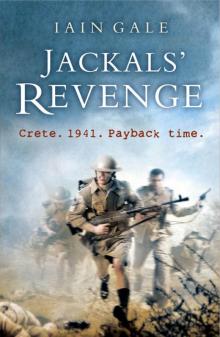 Jackals' Revenge
Jackals' Revenge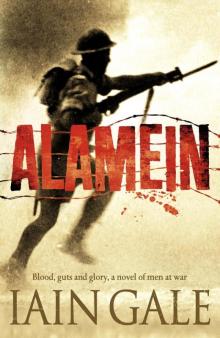 Alamein
Alamein Conspiracy
Conspiracy Four Days in June
Four Days in June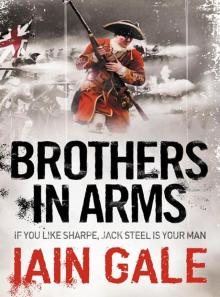 Brothers in Arms (Jack Steel 3)
Brothers in Arms (Jack Steel 3) Brothers in Arms
Brothers in Arms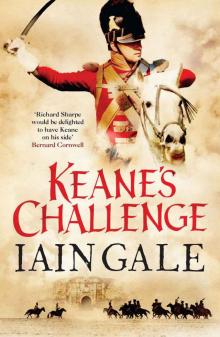 02 - Keane's Challenge
02 - Keane's Challenge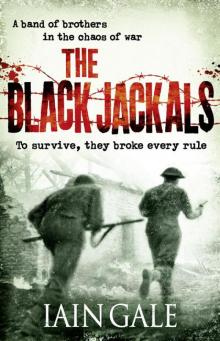 The Black Jackals
The Black Jackals Man of Honour
Man of Honour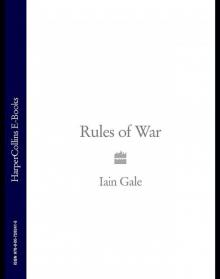 Rules of War
Rules of War